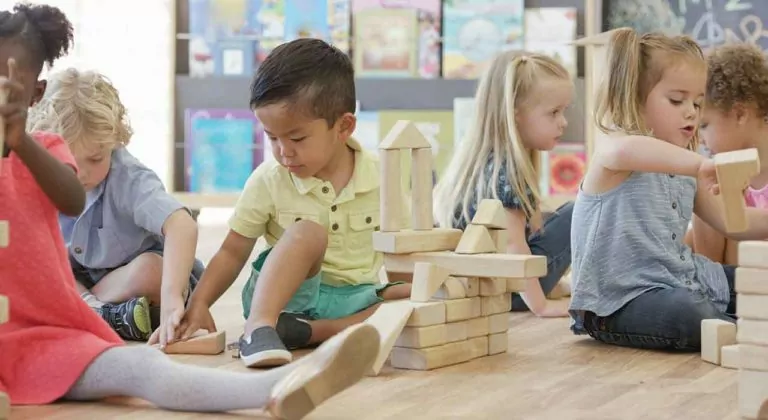In this twenty-first century, more and more children are being relegated to daycare or other institutions that look after them for a great many hours each day outside of the parental home. According to the US Census Bureau, as of 2015, about 3.64 million children were enrolled in public kindergartens in the United States, and another 428,000 in private ones. Statistics Canada reported that in 2011, almost half (46%) of Canadian parents reported using some type of childcare for their children, aged 14 years and younger, during that year. Many children obviously spend more time with childcare providers than with their family.
Various studies have shown that young children who spend time in daycare may bond less with their mothers than those who stay home. And it has also been concluded by other studies, that children who attend daycare experience more stress, have lower self-esteem and can be more aggressive.
“Even a child,” Proverbs 20:11 tells us, “is known by his actions, by whether his conduct is pure and right.” It seems a simple enough proverb and easy to understand. We have all encountered children’s actions – at home around the supper table, in a supermarket while we were shopping, in a classroom setting or on the street – and frequently found their actions lacking in moral wisdom. Greed, selfishness, anger, sloth and you name it, these vices surround cherubic faces like black halos.
So it neither surprises nor shocks us when Proverbs adds commandments such as:
“Do not withhold discipline from a child; if you punish him with the rod he will not die. Punish him with the rod and save his soul from death” (Prov. 23:13-14).
“He who spares the rod hates his son, but he who loves him is careful to discipline him” (Prov. 13:24).
But what does that have to do with preschool and daycare? Read on.
Johann Heinrich Pestalozzi: education is key to a better society
To understand today’s education system we need to know something of its history.
On January 12, 1746, Johann Heinrich Pestalozzi (pronounced Pesta–lotsi) was born in Zurich, Switzerland. His father died when he was only 6 years old and Johann was sent to school with the long-term goal of becoming a pastor.
As he grew older he developed a keen desire and vision to educate the poor children of his country. After completing his studies, however, and making a dismal failure of his first sermon, he exchanged the pulpit for a career in law. He reasoned within himself that perhaps he might accomplish more for the poor children of his country through law than through preaching. But after studying law, as well as opting for a number of other careers, in the long run Pestalozzi ended up standing behind a teacher’s lectern.
Now, throughout these formative years Johann Pestalozzi had been greatly influenced by Jean-Jacques Rousseau. Rousseau was that philosopher who repudiated original sin and who penned the words: “there is no original perversity in the human heart.” Pestalozzi fell for these false words – he fell hook, line and sinker.
Consequently, his principles in teaching strongly reflected the view that education could develop the pure powers of a child’s head, heart and hand. He thought, and he thought wrongly, that this would result in children capable of knowing and choosing what is right. In other words, educating students in the proper way would evolve towards a better society. Such a thing happen could only happen if human nature was essentially good and it was on this principle that Pestalozzi based his teaching.
Pestalozzi died in 1827 and his gravestone reads:
Heinrich Pestalozzi: born in Zurich, January 12, 1746 – died in Brugg, February 17, 1827. Saviour of the Poor on the Neuhof; in Stans, Father of the orphan; in Burgdorf and Munchenbuchsee, Founder of the New Primary Education; in Yverdon, Educator of Humanity. He was an individual, a Christian and a citizen. He did everything for others, nothing for himself! Bless his name!
As the engraving indicates, Pestalozzi was much admired, and his approach to education lived on after him, having a massive influence on various educators who followed.
Friedrich Froebel: the father of Kindergarten
One such person was a man by the name of Friedrich Froebel. Born in Oberweissbach, Thuringia in 1782, he was the fifth child of an orthodox Lutheran pastor. Interestingly enough, the boy heard his father preach each Sunday from the largest pulpit in all Europe. On it you could fit the pastor and twelve people, a direct reference to the twelve apostles.
Friedrich’s mother died when he was only nine months old. Perhaps his father did not have time for the boy, because when he was ten years old, he was sent to live with an uncle. During his teenage years he was apprenticed to a forester and later he studied mathematics and botany.
When he was 23, however, he decided for a career in teaching and for a while studied the ideas of Pestalozzi, ideas he incorporated into his own thinking. Education should be child-centered rather than teacher-centered; and active participation of the child should be the cornerstone of the learning experience. A child with the freedom to explore his own natural development and a child who balanced this freedom with self-discipline, would inevitably become a well-rounded member of society. Educating children in this manner would result in a peaceful, happy world.
As Pestalozze before him, Froebel was sure that humans were by nature good, as well as creative, and he was convinced that play was a necessary developmental phase in the education of the “whole” child. Dedicating himself to pre-school child education, he formulated a curriculum for young children, and designed materials called Gifts. They were toys which gave children hands-on involvement in practical learning through play.
He opened his first school in Blankenburg in 1837, coining the word “kindergarten” for that Play and Activity Center. Until that time there had been no educational system for children under seven years of age.
Froebel’s ideas found appeal, but its spread was initially thwarted by the Prussian government whose education ministry banned kindergarten in 1851 as “atheistic and demagogic” because of its “destructive tendencies in the areas of religion and politics.”
In the long run, however, kindergartens sprang up around the world.
Mom sends me to preschool
My mom was a super-good Mom as perhaps all Moms are who make their children feel loved. And how, at this moment when she has been dead and buried some 25 years, I miss her.
She had her faults, as we all do, and she could irritate me to no end at times, as I could her. But she was my Mom and I loved her. She was an able pastor’s wife and supported my Dad tremendously. Visiting numerous families with him, (in congregations in Holland she would walk with him to visit parishioners), she also brewed innumerable cups of tea for those he brought home. Always ready with a snack, she made come-home time after school cozy for myself and my five siblings, of whom I was the youngest.
In later years, being the youngest meant that I was the only one left at home, and it meant we spent evenings together talking, knitting, embroidering, reading and laughing. She was so good to me. Perhaps, in hindsight, I remember her kindness so well because I now see so much more clearly a lot of selfish attributes in myself – attributes for which I wish I could now apologize to my Mom.
My Mom was diagnosed with breast cancer when I was 32 – a young mother myself, with five little sets of hands tugging at my apron strings. I was devastated. But my quiet mother who always had been so nervous in leading ladies’ Bible studies and chairing women’s meetings, was very brave. She said she literally felt the prayers of everyone who loved her surround her hospital bed. She had a mastectomy, went into remission and lived eight more good years
Many young mothers are presently faced with a fork in the road decision – shall I go back to work or shall I stay home? Should I send my children to daycare, and thus help pay off the mortgage or should I stay home and change diapers? Times are tough. Groceries have to be bought, gas prices are ever increasing, and so is school tuition.
I delve back into my memories and remember – remember even now as my age approaches the latter part of three score plus years – that my father and mother placed me in a Froebel School, a preschool, when I had just turned four years old. I was not thrilled about the idea. As a matter of fact, I was terrified.
My oldest sister, who was eleven years my senior, was given the commission of walking me down the three long blocks separating our home from the school which housed my first classroom. My sister was wearing a red coat and she held my hand inside the pocket of the coat. It must have been cold. When we got to the playground which was teeming with children, she took me to the teacher on duty. I believe there was actually only one teacher. My sister then said goodbye to me and began to walk away.
The trouble was, I would not let go of the hand still ensconced in the pocket of her coat. The more she pulled away, the tighter I clung – and I had begun to cry. Eventually the lining of the pocket ripped. My sister, who was both embarrassed and almost crying herself, was free to leave. I was taken inside the school by the teacher.
It is a bleak memory and still, after all this time, a vivid memory. I do not think, in retrospect, that my mother wanted to get rid of me. Froebel schools were touted as being very good for preschool children. She, a teacher herself with a degree in the constructed, international language of Esperanto, possibly thought she was being progressive as well as making more time to help my father serve the congregation.
Dr. Maria Montessori, a follower of Heinrich Froebel, established the Dutch Montessori Society in 1917. By 1940, 5% of the preschools in Holland were following the Montessori system and 84% called themselves Froebel schools or Montessori schools. The general nametag is kleuterschool, (kleuter is Dutch and means a child between 4 and 6). Today the age limit is younger because of the increased interest in sending children of a younger age to school. Creativity and free expression are the curriculum norm.
Most of the memories I have of attending the Froebel school, (and let me add that it was for half days), are not pleasant. I recall braiding long, colored strips of paper into a slotted page. Afraid to ask permission to go to the bathroom, I also recall wetting my pants while sitting in front of a small wooden table in a little blue chair. My urine dripped onto the toes of the teacher as she passed through the aisle, checking coloring and other crafts. Such an experience as I gave that teacher cannot have been inspiring for her. Perhaps she always remembered it as one of the most horrible moments of her career. In any case, she took me by the hand to the front of the class and made me stand in front of the pot-bellied stove. Skirts lifted up behind me, she dried me off with a towel. Then she made me stay there as she put the little blue chair outside in the sunshine. At lunchtime she brought me home on the back of her bicycle. Knocking at our door, she called up to the surprised figure of my mother standing at the top of the stairs. (We occupied the second and third floor of a home.) “Your daughter’s had an accident.” I think I dreamt those words for a long, long time afterwards. But this I also clearly recall, that my mother was not angry.
Would I have been a better child had my mother kept me at home? Felt more secure? More loved? Perhaps. Perhaps not. There is always the providence of God which like a stoplight on a busy street corner abruptly halts one in condemning the actions of another. God had a purpose for me, no doubt about it, in all that occurred in my life – whether things during preschool days or later. And so He has in all our lives.
Conclusion
We live at a time when everything is fast-paced – food, travel, and entertainment. What we often don’t realize is that time is also fast – fast and fleeting – gone before we know it. Our little children, sinful from the time of conception, two years old today, will be twenty tomorrow and thirty the day after that. And when they wear out the coat of their allotted time span, will it have mattered who fed them each meal, who read books to them, who played with them and who disciplined them? When we think back to the Proverbs we started with, we realize this is a question we have to answer with the Bible as our guidebook.
The strange thing is that I now regret that I did not spend more time with my mother when she was old. I loved her very much and love usually translates into time.
For parents concerned with mortgage and groceries and other bills, the simple Proverb “Trust in the Lord with all your heart and lean not on your own understanding; in all your ways acknowledge Him, and He will make your paths straight” (Proverbs 3:5-6) is good to hang over their lintels. First things should be put first. I have never heard God’s people say that He has forsaken them.












